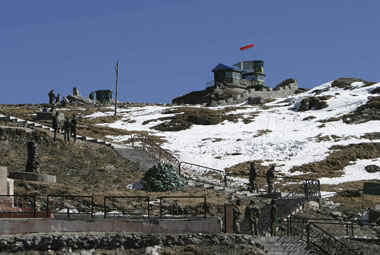
Even as the Sikkim border dispute between India and China shows no sign of abating, the Indian Army seems to have settled in for the long haul.
The army has pitched in tents, indicating that they are unlikely to retreat unless there was reciprocity from China’s People’s Liberation Army personnel in ending the face-off at an altitude of around 10,000 feet in the Sikkim section.
A steady line of supplies is being maintained for the soldiers at the site, official sources said, signalling that Indian Army is not going to wilt under any pressure from China. According to a report in The Times of India, India has moved 2,500 soldiers from their peace-time deployments in Sikkim to further reinforce its proactive stance.
Meanwhile, events are unfurling at breakneck speed on both sides of the border. Here are the most recent developments:
Officials on both sides soothe fears
On Monday, Li Rongrong, Second Secretary in the Economic and Commercial Counsellor’s Office of the Chinese Embassy in India allayed fears of India-China economic ties being affected.
“Both India and China enjoy long cooperation as our lands are connected,” Li said at a promotion conference of the 21st Century Maritime Silk Road International Expo to be held in the city of Dongguan in the Chinese province of Guangdong from 21 to 24 September.
Mohammad Sadiq, Secretary-General of the India-China Economic and Cultural Council, said that the current border standoff was an issue that would pass off quickly.
He assured that despite an advisory issued by the Chinese Embassy in New Delhi, all Chinese businesspersons in India were as safe as before.
Rahul Gandhi met Chinese ambassador, Congress admits
On Monday, after reports emerged about Congress denying that its vice-president Rahul Gandhi met with Chinese ambassador Luo Zhaohui on 8 July in New Delhi, the Grand Old Party did a complete U-turn.
Congress spokesperson Randeep Surjewala admitted that Gandhi had met the ambassadors of the neighbouring countries even as the party downplayed the meeting and did not specify its venue or time. Surjewala termed it a “courtesy call” and said envoys of G5, as well as neighbouring countries, keep meeting Congress president Sonia Gandhi and the vice-president from time to time.
News18 earlier reported that the Chinese Embassy’s website that had said that the two “exchanged views” on the “current bilateral relations” between the two nations. The Embassy website later deleted the post.
Surjewala had denied such media reports on Rahul’s meeting with Zhaohui as “fake news”. He had also alleged that the report was planted by the external affairs ministry and Intelligence Bureau sources.
New Delhi allows Tibetan government access to Pangong Lake, China reacts sharply
On Monday, The Economic Times reported that the Narendra Modi government on Wednesday allowed the Tibetan government in exile — on the eve of the Dalai Lama’s 82nd birthday — to perform rituals on the shores of Ladakh’s famed Pangong Lake along the disputed boundary with China and pray for the long life of their leader.
China responded by publishing an editorial in the state-run Global Times, warned India to refrain from playing the “Dalai Lama card”:
“When the Indian government attaches great importance to its relationship with China, it keeps a tight grip on anti-China political activities on its soil. However, when it is dissatisfied or has conflicts with Beijing, the Tibet card is played up. But India may overestimate the influence of Tibetan exiles. With the rise of China and as Tibet becomes better off, Tibetan independence runs counter to the will of Tibetans. The space for Tibetan separatists has been largely squeezed as more Western countries have snubbed the Dalai Lama. The Tibet card is gradually losing its value. If New Delhi is pulling the strings of the Tibetan exiles’ political act of flag-hoisting, it will only have burned itself.”
Chinese media says ‘third country’s army’ could enter Kashmir
An analyst at a Chinese think tank stated a “third country’s” army could enter Kashmir at Pakistan’s request, using the “same logic” the Indian Army used to stop the Chinese military from constructing a road in the Doka La area in the Sikkim sector on behalf of Bhutan.
Long Xingchun, director at the Centre for Indian Studies at China West Normal University, wrote in the Global Times:
“Even if India were requested to defend Bhutan’s territory, this could only be limited to its established territory, not the disputed area. Otherwise, under India’s logic, if the Pakistani government requests, a third country’s army can enter the area disputed by India and Pakistan, including India-controlled Kashmir.”
While the Chinese state media have carried a barrage of critical articles on the Doka La standoff criticising India, this was the first time Pakistan and Kashmir have been brought into the narrative.
“Indian troops invaded China’s Doklam area in the name of helping Bhutan, but in fact the invasion was intended to help India by making use of Bhutan,” the article said, referring to the 30 June statement issued by India’s external affairs ministry.
China and India have been engaged in a standoff in the Doka La area near the Bhutan tri-junction for the past three weeks after a Chinese Army’s construction party attempted to build a road. Doka La is the Indian name for the region which Bhutan recognises as Doklam, while China claims it as part of its Donglang region.
Of the 3,488-kilometre-long India-China border from Jammu and Kashmir to Arunachal Pradesh, a 220-kilometre section falls in Sikkim.
Courtesy: Firstpost














